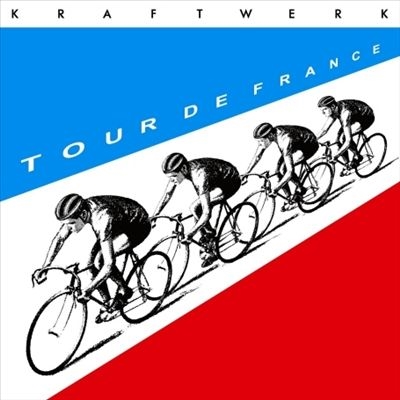2003年発売作品。タイトル通り、ツール・ド・フランス100年記念として制作された。ジャケットは1983年のシングル「ツール・ド・フランス」と同様のデザインを使用。20ページのブックレット付。
---
タワーレコード
Mojo - 4 stars out of 5 - "...A work of near-genius..."
Uncut - Ranked #12 in Uncut's "Albums Of The Year 2003"
Rolling Stone - 3 stars out of 5 - "...Masterminds Ralf Hutter and Florian Schneider mapped out the continent of electronic pop, and even now they belong and thrive there as much as anyone..."
The Wire - Included in Wire's "50 Records Of The Year [2003]"
Q - 3 stars out of 5 - "...There are moments where the glory years are emulated: 'La Forme's' gorgeous instrumental section and the eerie 'Regeneration' both exult in Kraftwerk's extraordinary magic..."
Rovi
Among electronic artists (as well as virtually the entire record industry), only Kraftwerk could construct a viable album by making only minimal adjustments to a sound they made definitive more than 30 years earlier. Tour de France Soundtracks, the group's first record in more than 15 years, is quintessentially Kraftwerk but still fits in well with contemporary dance trends like the experimental microhouse scene (highly influenced by the group's ultra-minimalism). The story of Tour de France Soundtracks actually begins 20 years earlier, in 1983, when Kraftwerk released the "Tour de France" single. Recorded in tribute to one of the sporting world's most grueling events, the track was a hi-res piece of dance-pop that made lyrical reference to various biking landmarks (like the infamous mountaintop finish at Tourmalet) and an assortment of sonic references as well (including a bike chain in free spin and the belabored breathing of a bicyclist -- in rhythm, of course). Techno-Pop, the album Kraftwerk scheduled to accompany "Tour de France," was postponed and later canceled (ironically, after a serious biking accident by Ralf Hutter, one of the group's resident biking maniacs). The track resurfaced two decades later, just in time for the centenary anniversary of the race, though Kraftwerk still missed the deadline -- only the rejuvenated single was available during the race. It has little in common with the original, but the new "Tour de France" is impressive nonetheless, boasting the kinetic power of a 100-strong peloton, a guttural Teutonic vocoder of the type beloved by fans, and a recurring tag so sublime Jan Ullrich could hum it through each of the Tour's 20 stages without fear of annoyance. Except for a closing reprise of the original "Tour de France," the rest of the album isn't as focused on biking; Hutter and Schneider construct sublime beatpieces with conceptual lines close to biking topics ("Aero Dynamik," "Titanium," "Chrono," "Vitamin"), but never confront the listener with yet another track dropping bike terms like peloton or a l'enfer du nord. "Chrono" is the track closest to the Kraftwerk ideal, with its future-shock synth and percussion precision, while "Vitamin" is the farthest away (a downbeat track that still could only have escaped from the Kling Klang studio). Tour de France Soundtracks is a successful record on anyone's terms; it's one that fans won't need to cringe from, and one that newcomers will be able to enjoy for what it is. ~ John Bush|
Rovi
Among electronic artists (as well as virtually the entire record industry), only Kraftwerk could construct a viable album by making only minimal adjustments to a sound they made definitive more than 30 years earlier. Tour de France Soundtracks, the group's first record in more than 15 years, is quintessentially Kraftwerk but still fits in well with contemporary dance trends like the experimental microhouse scene (highly influenced by the group's ultra-minimalism). The story of Tour de France Soundtracks actually begins 20 years earlier, in 1983, when Kraftwerk released the "Tour de France" single. Recorded in tribute to one of the sporting world's most grueling events, the track was a hi-res piece of dance-pop that made lyrical reference to various biking landmarks (like the infamous mountaintop finish at Tourmalet) and an assortment of sonic references as well (including a bike chain in free spin and the belabored breathing of a bicyclist -- in rhythm, of course). Techno-Pop, the album Kraftwerk scheduled to accompany "Tour de France," was postponed and later canceled (ironically, after a serious biking accident by Ralf Hutter, one of the group's resident biking maniacs). The track resurfaced two decades later, just in time for the centenary anniversary of the race, though Kraftwerk still missed the deadline -- only the rejuvenated single was available during the race. It has little in common with the original, but the new "Tour de France" is impressive nonetheless, boasting the kinetic power of a 100-strong peloton, a guttural Teutonic vocoder of the type beloved by fans, and a recurring tag so sublime Jan Ullrich could hum it through each of the Tour's 20 stages without fear of annoyance. Except for a closing reprise of the original "Tour de France," the rest of the album isn't as focused on biking; Hutter and Schneider construct sublime beatpieces with conceptual lines close to biking topics ("Aero Dynamik," "Titanium," "Chrono," "Vitamin"), but never confront the listener with yet another track dropping bike terms like peloton or a l'enfer du nord. "Chrono" is the track closest to the Kraftwerk ideal, with its future-shock synth and percussion precision, while "Vitamin" is the farthest away (a downbeat track that still could only have escaped from the Kling Klang studio). Tour de France Soundtracks is a successful record on anyone's terms; it's one that fans won't need to cringe from, and one that newcomers will be able to enjoy for what it is. ~ John Bush
Rovi
ミスター・エレクトロニック、17年ぶりのオリジナル・アルバム(涙)。フューチャリズムの象徴である御大が本当の21世紀にこうして活動していること自体、感慨深いものがあります。さて、気になる音は……現行のモダン・エレクトロニカを導入した仕上がり。とは言っても、あの牧歌的メロディーと無血ヴォイスという伝家の宝刀が振り下ろされるとクラフトワーク以外の何物でもないんですが。未来主義よ永遠なれ。
bounce (C)鈴木 真広
タワーレコード(2003年09月号掲載 (P86))
30年以上も活動を続け、たくさんのテクノ・アーティスト達に多大な影響を与え続けるテクノの神様「クラフトワーク」。オリジナルアルバムとしては17年振りとなる新作登場!!100周年を迎えた自転車レーズツールド・フランス"を彩るサントラ的な内容になっています。あのグルーヴが復活です! (C)稲田
タワーレコード(2003/08/13)



